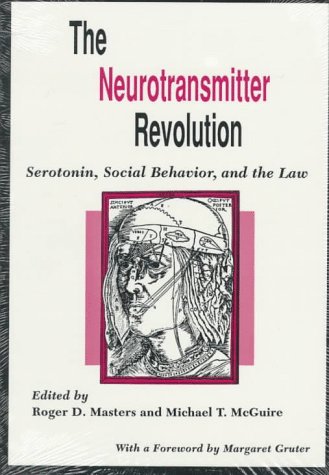Items related to The Neurotransmitter Revolution: Serotonin, Social...

Synopsis
Extraordinary advances in neurochemistry are both transforming our understanding of human nature and creating an urgent problem. Much is now known about the ways that neurotransmitters influence normal social behavior, mental illness, and deviance. What are these discoveries about the workings of the human brain? How can they best be integrated into our legal system?
These explosive issues are best understood by focusing on a single neurotransmitter like serotonin, which is associated with such diverse behaviors as dominance and leadership, seasonal depression, suicide, alcoholism, impulsive homicide, and arson. This book brings together revised papers from a conference on this theme organized by the Gruter Institute for Law and Behavioral Research, supplemented with articles by leading scholars who did not attend. Contributors include psychiatrists, neurologists, social scientists, and legal scholars.
The Neurotransmitter Revolution presents a unique survey of the scientific and legal implications of research on the way serotonin combines with other factors to shape human behavior. The findings are quite different from what might have been expected even a decade ago.
The neurochemistry of behavior is not the same thing as genetic determinism. On the contrary, the activity of serotonin varies from one individual to another for many reasons, including the individual’s life experience, social status, personality, and diet. And there are a number of major neurotransmitter systems, each of which interacts with the other. Behavior, culture, and the social environment can influence neurochemistry along with inheritance. Nature and nurture interact and these interactions can be understood from a vigorously scientific point of view.
The fact that our actions are heavily influenced by neurotransmitters like serotonin is bound to be disquieting. A sophisticated understanding of law and human social behavior will be needed if our society is to respond adequately to these rapid advances in our knowledge. This book is an essential step in that direction, providing the first comprehensive survey of the biochemical, social, and legal considerations arising from research on the behavioral effects of serotonin and related neurotransmitters.
"synopsis" may belong to another edition of this title.
About the Author
Roger D. Masters is Nelson A. Rockefeller Professor of Government at Dartmouth College and General Editor of the Gruter Institute Reader in Biology, Law, and Human Social Behavior.
Michael T. McGuire is a professor of psychiatry and biobehavioral sciences and director of the Neuropsychiatric Institute at the University of California at Los Angeles Medical School.
Review
"This volume is an outstanding example of how the ethology of law can contribute to a better understanding of the legal and social implications of the discoveries of contemporary biology."—Margaret Gruter, from the Foreword
"About this title" may belong to another edition of this title.
- PublisherSouthern Illinois University Press
- Publication date1994
- ISBN 10 0809318016
- ISBN 13 9780809318018
- BindingPaperback
- LanguageEnglish
- Edition number1
- Number of pages272
- EditorMasters Professor Roger D., McGuire Michael T.
Shipping:
FREE
Within U.S.A.
Search results for The Neurotransmitter Revolution: Serotonin, Social...
The Neurotransmitter Revolution: Serotonin, Social Behavior, and the Law
Seller: ThriftBooks-Atlanta, AUSTELL, GA, U.S.A.
Paperback. Condition: Good. No Jacket. Pages can have notes/highlighting. Spine may show signs of wear. ~ ThriftBooks: Read More, Spend Less 1.3. Seller Inventory # G0809318016I3N00
Quantity: 1 available
The Neurotransmitter Revolution: Serotonin, Social Behavior, and the Law
Seller: Book Alley, Pasadena, CA, U.S.A.
Paperback. Condition: Good. Good. May have some wear, signs of age and water damage to first few pages. /or limited markings, but is still in solid reading condition. Pasadena's finest new and used bookstore since 1992. Seller Inventory # mon0000454231
Quantity: 1 available
The Neurotransmitter Revolution: Serotonin, Social Behavior, and the Law
Seller: Bulrushed Books, Moscow, ID, U.S.A.
Condition: Good. LIGHTNING FAST SHIPPING! Text In Good condition- Has Used Stickers, pages may have marks and notes throughout and on edges Binding solid. Ships Fast! Seller Inventory # #115D-0151
Quantity: 1 available
The Neurotransmitter Revolution: Serotonin, Social Behavior, and the Law
Seller: dsmbooks, Liverpool, United Kingdom
Paperback. Condition: Good. Good. book. Seller Inventory # D7S9-1-M-0809318016-6
Quantity: 1 available

